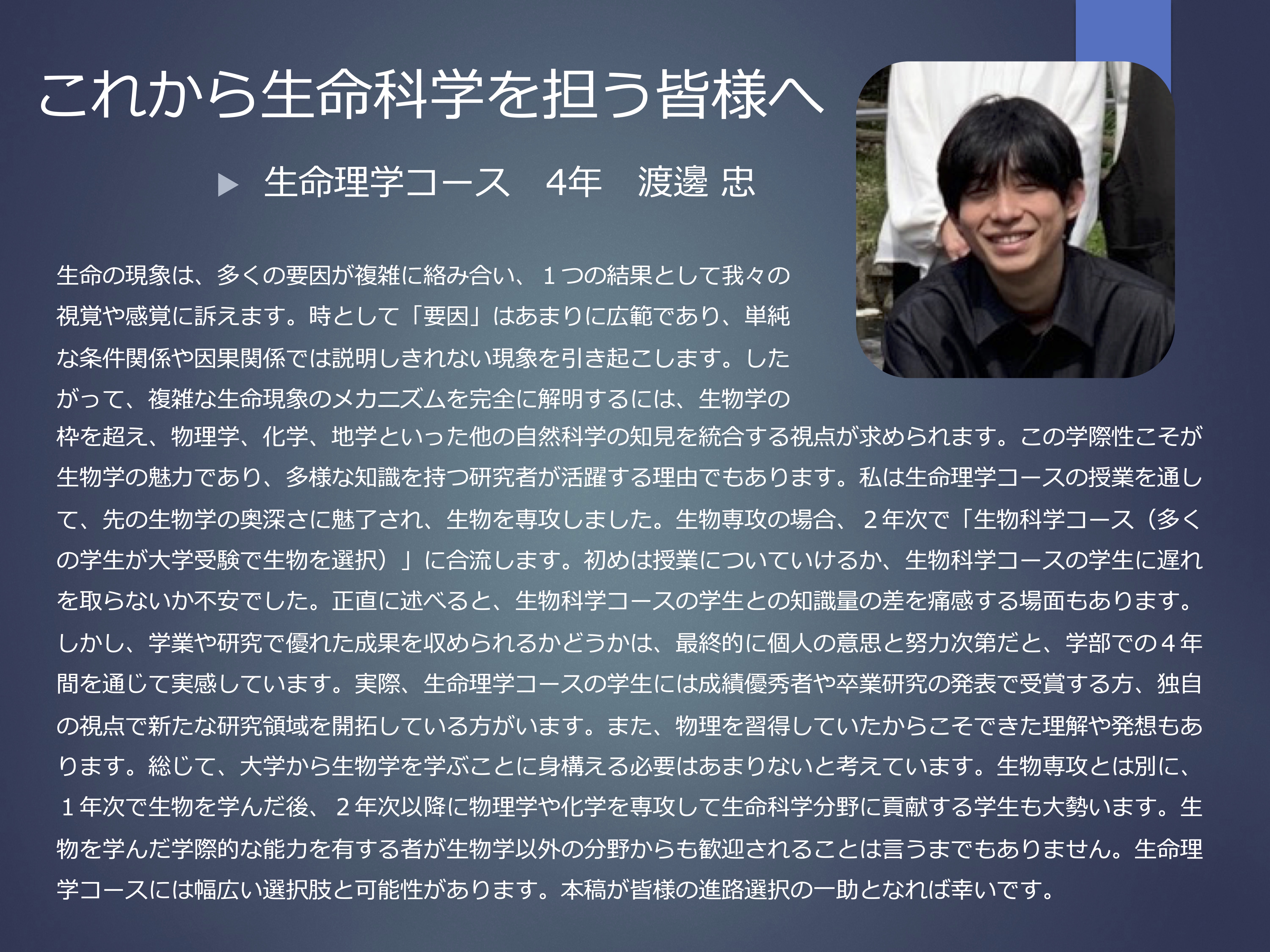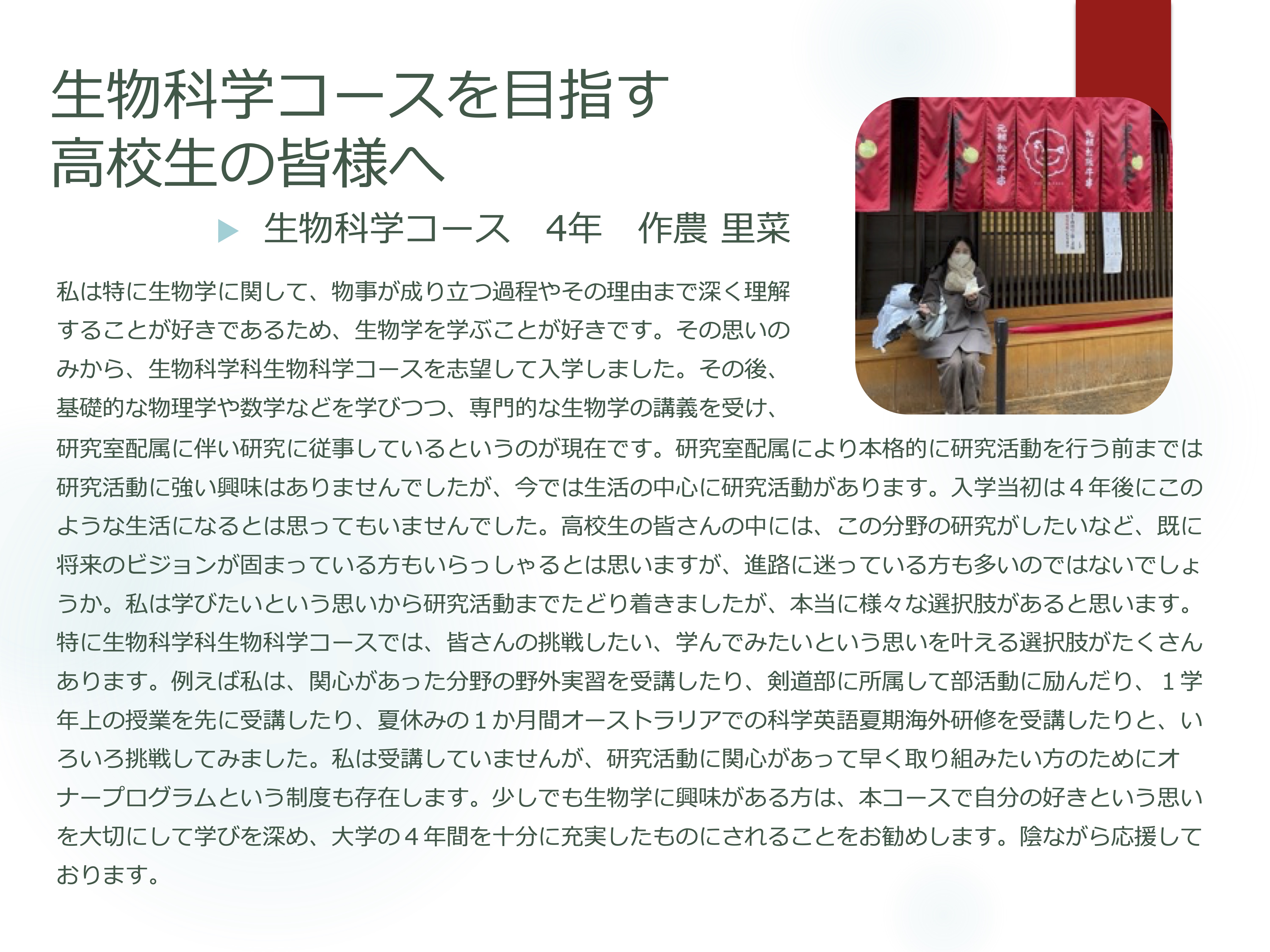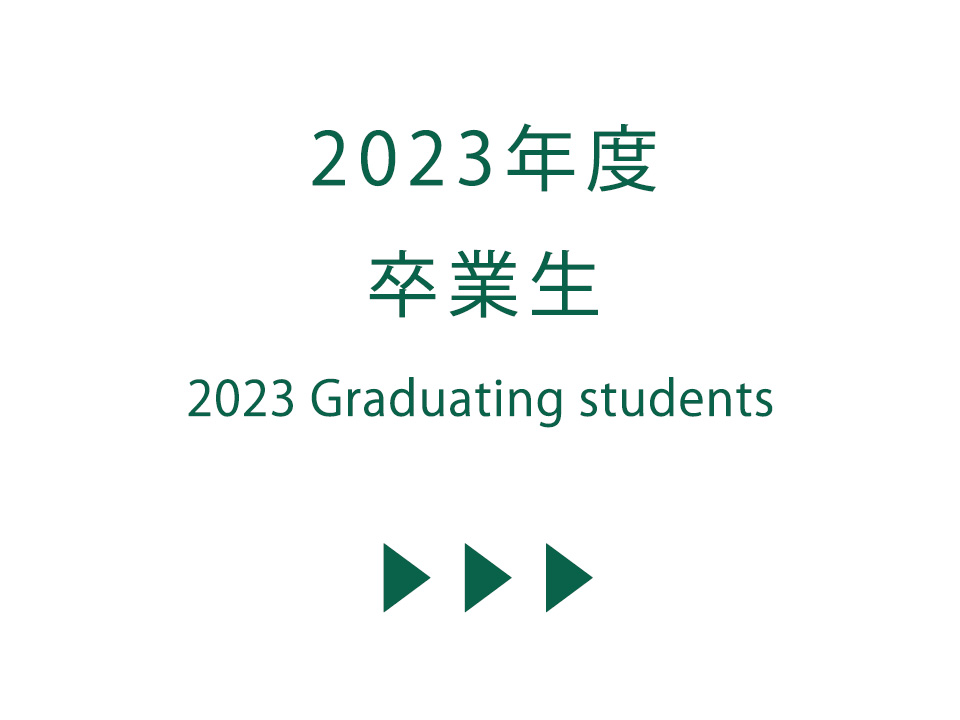Undergraduate
Educational Goals and Policies
Educational Goals
The educational objectives of the degree program "Biological Sciences" are as follows, based on the educational objectives of TUAT and the Faculty of Science. The Department of Biology was established in 1949 with the aim of gaining a physical and chemical understanding of the phenomena of life, rather than being restricted to the then prevailing distinctions between zoology and botany. The aim of the Department of Biology and Life Science is to train students for the 21st century in the natural sciences and the life sciences, while continuing to develop the traditional study of biology.
Overview
The life sciences, often referred to as the disciplines of the 21st century, are exploding with growth in medicine, pharmacy, science, engineering, and agriculture. Biology, one of the sciences, is the study of life phenomena displayed by various living organisms on the earth. 20th century biology has made many great discoveries and achieved remarkable progress both as a discipline and as a scientific technology, and has become the center of the scientific world. The name "Biological Sciences" is a reflection of this. The name "Biological Sciences" is a reference to the field of natural sciences appropriate for the 21st century, while maintaining the traditions of the previous studies of biology.
What is the Department of Biological Sciences?
The Department of Biology was founded in 1949 as a specialist in the understanding of the physics and chemistry of living organisms, with the aim of understanding life phenomena beyond the traditional boundaries of zoology and botany. The Department of Biology has developed ahead of its time, producing many excellent students, and celebrated its 60th anniversary in 2009. In response to this situation, the name of the department was changed to "Department of Biological Sciences" in 2005. The Department of Biological Sciences offers a wide range of opportunities to become not only a researcher in the natural sciences, but also a researcher, engineer, or teacher in the life sciences, or in the development of pharmaceuticals, foods, and other products. The course is designed to provide students with an insight into how living organisms live and why. From those who have simple questions, to those who want to develop something useful for society by applying the student sciences, this department is the best place for those who want to be active in various fields of developing student sciences as a career path after graduation.
Two courses in the Department of Biological Sciences
Aiming to nurture the next generation of human resources who will lead the life sciences, which are expected to develop in the future, the Life Science course is separate from the Biological Science course. The Life Science Course is an educational program to life science, in which students learn physics, chemistry, and mathematics. The university entrance examination is divided into two courses.
Background of Life Science Course Establishment
Biological Science Course
This course offers students the opportunity to learn about the evolution and development of living organisms, cell biology to learn how cells, the basic unit of life, work, and molecular biology and biochemistry to learn about the structure and function of DNA and proteins, the molecules that make up living organisms. Students can also study a wide range of research subjects, including microorganisms, plants, and animals. Most of these biological sciences are experimental sciences. For this reason, the course offers many laboratory courses for students from their early undergraduate years to their senior year. The goal of this course is to develop individuals who can carry on and develop current biology.
Life Science Course
In the life sciences, the multidisciplinary fields that transcend area of study are important.In order to solve the fundamental issues of 'why' and 'how' organisms live, it is important to link and integrate the vast amount of data that is being elucidated in mathematics, physics, chemistry, and biology. The Life Science course aims to nurture researchers in biology who understand mathematics, physics, and chemistry, or researchers in chemistry, physics, and mathematics who can understand life phenomena, who will pioneer new fields in life science.
This course is unique in that students can choose their career path (department in which they will conduct their graduation research, see figure on the next page) after entering the program. For this reason, it is necessary to learn a wide range of basic knowledge in addition to biology. Therefore, more classes and practical training courses in physics, chemistry, and mathematics are offered than in the Biological Sciences Course. In order to correspond to the study curriculum after admission, physics and chemistry are also required in the entrance examination.
Specialized education courses (including required and elective) offered by the Department of Biological Sciences

-
First year
common education
First year provides a broad perspective and a solid foundation
-
2nd year
specialized subjects
specialized subjects are the main focus of the program
-
3rd year
specialized subjects
3rd year specialized experimental subjects, etc.
-
4th year
specialized courses
students conduct their graduation research in a laboratory with the goal of making world-first discoveries.
Student (College) Life
The winners of the Best Presentation Award at the 2024 Graduation Research Presentation held on February 17-18, 2025, contributed essays to inform high school students about the appeal, characteristics, and difficulties of the Department of Biological Sciences.




















